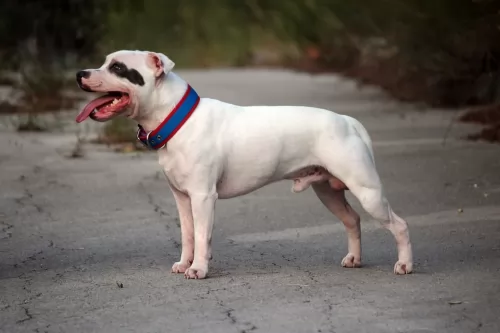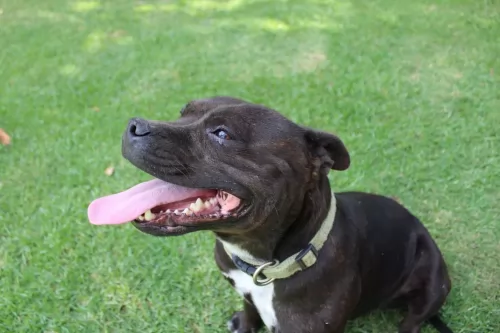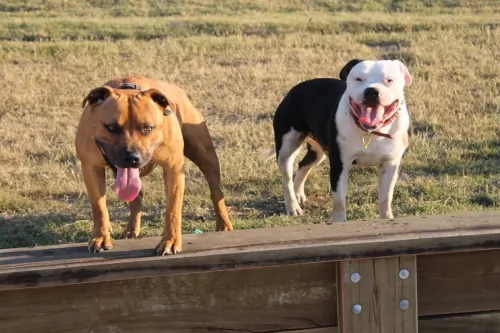 Petzlover
Petzlover Labradoodle is originated from Australia but Staffordshire Bull Terrier is originated from United Kingdom. Labradoodle may grow 22 cm / 9 inches higher than Staffordshire Bull Terrier. Labradoodle may weigh 13 kg / 29 pounds more than Staffordshire Bull Terrier. Both Labradoodle and Staffordshire Bull Terrier has almost same life span. Labradoodle may have more litter size than Staffordshire Bull Terrier. Labradoodle requires Moderate Maintenance. But Staffordshire Bull Terrier requires Low Maintenance
Labradoodle is originated from Australia but Staffordshire Bull Terrier is originated from United Kingdom. Labradoodle may grow 22 cm / 9 inches higher than Staffordshire Bull Terrier. Labradoodle may weigh 13 kg / 29 pounds more than Staffordshire Bull Terrier. Both Labradoodle and Staffordshire Bull Terrier has almost same life span. Labradoodle may have more litter size than Staffordshire Bull Terrier. Labradoodle requires Moderate Maintenance. But Staffordshire Bull Terrier requires Low Maintenance
 The Labradoodle is certainly a popular cross breed dog which was developed originally in Australia to be a hypoallergenic guide dog.
The Labradoodle is certainly a popular cross breed dog which was developed originally in Australia to be a hypoallergenic guide dog.
The dog is a cross between a Labrador and a Poodle, possessing some of the excellent characteristics from each dog while also being a low shedding dog.
The Labradoodle became known in 1988 when an Australian breeder, crossed the Labrador Retriever and Standard Poodle. The success of the dog led other breeders to begin breeding with Labradors and Poodles, with breeders wanting to move the dog from hybrid to official breed status. As of today, the Labradoodle isn’t recognized as a breed by the American Kennel Club.
 The Staffordshire Bull Terrier was first developed in the northern sections of Birmingham and in Staffordshire, England. The Staffie is a cross between a Black and Tan Terrie and the Bulldog, but had other breeds crossed in over time in order to create a bull-baiting dog and a fighting dog. In the Victorian age these sports were banned but dog fighting went underground and continues on some level today.
The Staffordshire Bull Terrier was first developed in the northern sections of Birmingham and in Staffordshire, England. The Staffie is a cross between a Black and Tan Terrie and the Bulldog, but had other breeds crossed in over time in order to create a bull-baiting dog and a fighting dog. In the Victorian age these sports were banned but dog fighting went underground and continues on some level today.
The Staffordshire Bull Terrier was exceptional at these “sports” due to his build, power and jaw strength. Today’s Staffie is a descendent of those early Bull Terrier crosses. Together with the Bull Terrier and the American Pit Bull, the Staffie also traces its roots back to those original English Bully dogs. All three breeds have the Bulldog in common.
After dog fighting and bull baiting were banned the Stafforshire Bull Terrier was further developed as a companion and pet. Still their reputation as fighting dogs cost them recognition in the official kennel clubs for some time. They finally made the UK registry in 1935, but it was not until 1974 that the American Kennel Club (AKC) accepted them.
 The Labradoodle can come in different sizes – miniature, medium and standard. The standard Labradoodle is a large dog which stands at 53 to 63cm and weighs 23 to 30kg.
The Labradoodle can come in different sizes – miniature, medium and standard. The standard Labradoodle is a large dog which stands at 53 to 63cm and weighs 23 to 30kg.
The coat also differs and it can be made up of tight curls or it can be thick and wavy or even straight. The coat is of medium length and is available in lots of colors – cream, apricot, black, whitish, brown and even a brindle color.
Strong and muscular, he has floppy ears and the tail which was once docked, is left long these days and hangs down or it can be carried somewhat upright and curved.
Known as a designer breed, your Labradoodle is sure to be nothing but a pleasure for you, being a 100% companion dog.
Because he comes from two popular dog breeds of which each possess some exceptional characteristics, your Labradoodle could inherit any or all of the characteristics from one or both dogs. He has also been bred to be a hypoallergenic dog which means you aren’t going to have to worry about too much hair flying around. But there again, if he has inherited more of the Labrador’s coat then there will be some shedding.
Because of his amicable nature, he makes a good first-choice dog for first-time dog owners too. The friendly nature of the dog doesn’t make him a particularly good watch dog however.
These are dogs which are happiest when they’re with their human family. They’re a dog breed which is also easy to train because he is intelligent and an eager-to-please dog. He gets on well with children in the home as well as with other pets.
He is the kind of dog that is willing to blend into your lifestyle. If you’re quietly reading indoors he will be lying with you and if you’re pursuing some outdoor activity, he’ll be happy to join right in with you.
The beauty about the Labradoodle is that he can adapt to any kind of lifestyle in the city or countryside, but he wouldn’t be recommended for a place with hardly any garden.He is the kind of dog who will certainly need to be exercised and he will want to join you in your outdoor activities.
It is important to remember that the way your Labradoodle turns out will be affected by socialization and training, his genes and your home and lifestyle.
 The Staffordshire is a muscular, stocky and unusually strong breed, small to medium size in height and build. They have broad, powerful chests, wide set, strong legs, strong shoulders, broad head with a fairly short muzzle. Their ears are not cropped but they are short and fold over. The coat is stiff, close and short and the tail is medium and carried low. Most Staffies are brown, but they can be red, brindle with white, fawn, black, white or blue.
The Staffordshire is a muscular, stocky and unusually strong breed, small to medium size in height and build. They have broad, powerful chests, wide set, strong legs, strong shoulders, broad head with a fairly short muzzle. Their ears are not cropped but they are short and fold over. The coat is stiff, close and short and the tail is medium and carried low. Most Staffies are brown, but they can be red, brindle with white, fawn, black, white or blue.
 Maybe it’s the diversity of Labradoodles that makes them so popular – as you never know quite what you’re going to get.
Maybe it’s the diversity of Labradoodles that makes them so popular – as you never know quite what you’re going to get.
Everyone agrees however that these cross-breeds make lovable, wonderful pets - lovely to look at and with all the qualities needed to ensure he is man's best friend. They’re available in 3 sizes but each size is going to make you an incredibly amazing pet and companion.
 1.Children friendliness The breed adores children but care should still be taken because they are so strong and their jaws are so powerful.
1.Children friendliness The breed adores children but care should still be taken because they are so strong and their jaws are so powerful.
2.Special talents they adore children and they one of the most powerful jaws among canines.
 Labradoodles can be a little bit unpredictable when it comes to their health because they can inherit problems common to one or both parent breeds. This means you could well have to deal with hip dysplasia or one of the many eye disorders there are.
Labradoodles can be a little bit unpredictable when it comes to their health because they can inherit problems common to one or both parent breeds. This means you could well have to deal with hip dysplasia or one of the many eye disorders there are.
These dogs could well be susceptible to an eye disease known as progressive retinal atrophy which is an inherited disease which can result in blindness.
Because they have floppy ears, the inside of the ear can accumulate dirt, wax and moisture, and this combination can lead to bacteria within the ear and to an infection if nothing is done to clean the inside of the ear. There are products available which can help you to gently clean the ears.
Addison's Disease is a disease found in Poodles and Labradors.It is where the pituitary gland doesn’t create the hormone ACTH. This hormone regulates cortisol and without cortisol, your Labradoodle can’t digest food properly.
Dogs with Addison's disease are usually lethargic, thirsty, they urinate often and they have an abnormally fast heart rate.
 • Patella luxation otherwise known as a slipped kneecap- can cause pain and some lameness.
• Patella luxation otherwise known as a slipped kneecap- can cause pain and some lameness.
• Skin allergies and even a tendency toward Mange which is chronic in some forms and fatal in others.
• Like most active dogs their size, they are susceptible to bloat which can be fatal if not treated immediately.
 Grooming your Labradoodle will be necessary if you want the coat to look bright, vibrant and healthy. Not all Labradoodles will have the same coats, so grooming requirements might be different from dog to dog.
Grooming your Labradoodle will be necessary if you want the coat to look bright, vibrant and healthy. Not all Labradoodles will have the same coats, so grooming requirements might be different from dog to dog.
As with any dog, he will also need a brush-down twice a week. Also your Labradoodle might require trimming or clipping which will help you to maintain the coat in an easier fashion.
Make sure to ensure a top quality diet suited to his size, age and energy levels. Check him over regularly for illnesses and make sure you provide him with lots of love and attention.
 1.Feeding the puppy Don’t over feed as he grows fast. Feed a high quality dog food for medium size puppies. Feed 1-2 and a quarter cups in 3-4 meals per day.
1.Feeding the puppy Don’t over feed as he grows fast. Feed a high quality dog food for medium size puppies. Feed 1-2 and a quarter cups in 3-4 meals per day.
2.Feeding the adult Don’t exercise right before or after eating due to potential for bloat. Feed 1-2 times a day a high quality medium breed dog food.
4. Games and Exercises They are terriers after all and they dig. Need a fairly large yard with a strong fence. They love to play ball, frisbee and can excel at cart pulling.